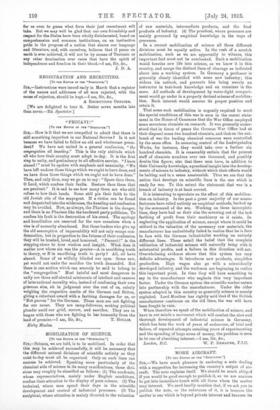MOBILIZATION OF SCIENCE.
[To TER EDITOR or TER "SPECTATOR."]
SIR,—Science, we are told, is to be mobilized. In order that this may be achieved successfully, it will be necessary that the different natural divisions of scientific activity as they exist to-day must all be organized. Only on such lines can success be achieved. Speaking more particularly of the chemical side of science in its many ramifications, these divi- sions may roughly be classified as follows: (1) The academic, whose representatives, mainly under English conditions, confine their attention to the display of pure science. (2) The technical, where men spend their days in the scientific development and control of industrial processes. (3) The analytical, where attention is mainly directed to the valuation of raw materials, intermediate products, and the final products of industry. (4) The practical, where processes are mainly governed by empirical knowledge in the ways of processes.
In a correct mobilization of science all these different divisions must be equally active. In the rush of a scratch mobilization, such as we are apparently to witness, this important fact must not be overlooked. Such a mobilization would breathe new life into science, as we know it in this country, and merge the distinct lines of cleavage as indicated above into a working system. In Germany a professor is generally closely identified with some new industry ; this widens his outlook, and prevents him being merely an instructor in text-book knowledge and an examiner in the same. All methods of development by water-tight comport. ment would go under in a properly devised scheme of mobiliza- tion. Each interest would assume its proper position and retain it.
That some such mobilization is 'urgently required to meet the special conditions of this war is seen in the recent state- ment in the House of Commons that the War Office employed some seventeen chemists on research. It was generally under- stood that in times of peace the German War Office had at their disposal some two hundred chemists, and that on the out- break of war the leading chemical concerns were controlled by the same office. In assuming control of the Ludwigshafen Works, for instance, they would take over a further six hundred chemists. It is reasonably certain that the present staff of chemists numbers over one thousand, and possibly double this figure; also that these men have, in addition' to their University knowledge, a practical insight into the develOp. meats of science to industry, without which their efforts would be halting and in a sense amateurish. Thus we see that the nation that develops on scientific lines is the one which is ready for war. To this extent the statement that war is a branch of industry is at least correct.
It is interesting to speculate on the effect of this mobiliza- tion on industry. In the past a great majority of our manu- facturers have relied entirely on empirical methods, backed up by the command of the sea. Working on these incomplete lines, they have had as their aim the screwing out of the last farthing of profit from their machinery as it exists. In neglecting the application of science, except where it could be utilized in the valuation of the necessary raw materials, the manufacturer has undoubtedly failed to realize that he is face to face with the German industrialist working on entirely different lines. These entail the belief that the complete utilization of industrial science will naturally bring with it substantial profits, and a failure in this direction will not. Overwhelming evidence shows that this system has very definite advantages. It introduces new products, simplifies production. High wages also go with a scientifically developed industry, and the workmen are beginning to realize this important point. In time they will have something to say to the manufacturer who neglects this very important factor. Under the German system the scientific worker enters into partnership with the manufacturer. Under the older system adopted in this country so generally science is merely exploited. Lord Moulton has rightly said that if the British manufacturer continues on the old lines, the war will have been fought in vain.
When therefore we speak of the mobilization of science, and have in our minds a movement which will combat the slow and thorough development of industrial science in Germany, which has been the work of years of endeavour, of trial and failure, of repeated attempts entailing years of experimenting and the spending of huge sums of money, the problem is seen to be one of absorbing interest.—I am, Sir, &c.,


































 Previous page
Previous page